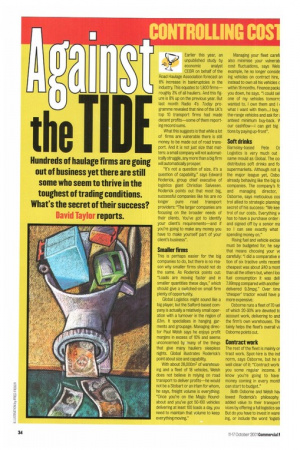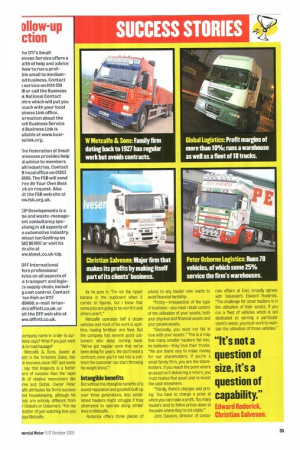the T.
Page 34

Page 35

If you've noticed an error in this article please click here to report it so we can fix it.
Hundreds of haulage firms are going out of business yet there are still some who seem to thrive in the toughest of trading conditions. What's the secret of their success? David Taylor reports.
Earlier this year, an unpublished study by economic analyst CEBR on behalf of the Road Haulage Association forecast an 8% increase in bankruptcies in the industry. This equates to 1,800 firms— roughly 3% of all hauliers. And this figure is 8% up on the previous year. But last month Radio 4's Today programme revealed that nine of the UK's top 10 transport firms had made decent profits—some of them reporting record sums.
What this suggests is that while a lot of firms are vulnerable there is still money to be made out of road transport. And it is not just size that matters: a small company will not automatically struggle, any more than a big firm will automatically prosper.
"It's not a question of size, it's a question of capability," says Edward Roderick, group chief executive of logistics giant Christian Salvesen. Roderick points out that most big, successful companies like his are no longer pure road transport providers: "The larger companies are focusing on the broader needs of their clients. You've got to identify your client's requirements—and if you're going to make any money you have to make yourself part of your client's business".
Smaller firms This is perhaps easier for the big companies to do, but there is no reason why smaller firms should not do the same. As Roderick points out: "Loads are moving faster and in smaller quantities these days," which should give a switched-on small firm plenty of opportunity.
Global Logistics might sound like a big player, but the Salford-based company is actually a relatively small operation with a turnover in the region of £3m. It specialises in hanging garments and groupage. Managing director Paul Welsh says he enjoys profit margins in excess of 10% and seems unconcerned by many of the things that give many hauliers sleepless nights. Global illustrates Roderick's point about size and capability.
With about 28,000m2 of warehousing and a fleet of 18 vehicles, Welsh does not believe in relying on road transport to deliver profits—he would not be a Stobart or an 'dam for whom, he says, freight volume is everything: "Once you're on the Magic Roundabout and you've got 50-100 vehicles delivering at least 100 loads a day, you need to maintain that volume to keep everything moving." Managing your fleet careft also minimise your vulnerab cost fluctuations, says Weis example, he no longer considE ing vehicles on contract hire, instead to own all his vehicles c within 18 months. Finance packE you down, he says. "I could sel one of my vehicles tomorrc wanted to. I own them and I what I want with them...I buy the-range vehicles and ask for ; anteed minimum buy-back. V our cashflow—I can get big tions by paying up-front".
Soft drinks Barnsley-based Pete OE Logistics is very much out same mould as Global. The co distributes soft drinks and fo supermarkets. Although not q the major league yet, Osbo already behaving like the big lo companies. The company's fc and managing director, Osborne, says meticulous cos trol allied to strategic planning secret of his success: "We kee trol of our costs. Everything v has to have a purchase order I and signed off by a senior ma so I can see exactly what spending money on."
Rising fuel and vehicle excise must be budgeted for, he say; that means choosing your VE carefully: "I did a comparative e tion of six tractive units recentl cheapest was about £40 a monl than all the others but, when 1100 fuel consumption it was deli 7.89mpg compared with another delivered 9.3mpg." Over timE 'cheaper' tractor would have p more expensive.
Osborne runs a fleet of 70 ve of which 20-30% are devoted tc account work, delivering to anc the firm's own warehouses. Thi tainly helps the fleet's overall vi Osborne points out.
Contract work The rest of the fleet is mainly or tract work. Spot-hire is the Inc norm, says Osborne, but he E well clear of it: "Contract work you some regular income. I know you're going to have money coming in every mont can start to budget."
Both Osborne and Welsh ha) lowed Roderick's philosophy added value to their transpor Vices by offering a full logistics se But do you have to invest in ware ing, or include the word logist company name in order to surhese days? What if you just want 3k to road haulage?
Metcalfe & Sons, based at sett in the Yorkshire Dales, has in business since 1927 and some : say that longevity is a better ;ure of success than the rapid th of relative newcomers like irne and Global. Owner Peter alfe attributes his firm's success iod housekeeping, although his ods are entirely different from r Global's or Osborne's: "For me matter of just watching how you 3ays Metcalfe. As he puts it: "I'm not the ripest banana in the cupboard when it comes to figures, but I know that some jobs are going to be worth it and others aren't."
Metcalfe operates half a dozen vehicles and most of his work is spothire, hauling fertiliser and feed. But the company has several good customers who keep coming back: "We've got regular work that we've been doing for years. We don't need a contract; once you're tied into a contract the customer can start throwing his weight about."
Intangible benefits
But without the intangible benefits of a sound reputation and goodwill built up over three generations, less established hauliers might struggle if they attempted to operate along similar lines to Metcalfe.
Roderick offers three pieces of advice to any haulier who wants to avoid financial hardship:
"Firstly—irrespective of the type of business—you must retain control of the utilisation of your assets, both your physical and financial assets and your people assets.
"Secondly, you must not fat in love with your assets." This is a trap that many smaller hauliers fall into, he believes—they love their trucks. "We are there only to make money for our shareholders. If you're a small family firm, you are the shareholders. If you reach the point where an asset isn't delivering a return, you must realise that asset and re-invest the cash elsewhere.
"Thirdly, there's charges and pricing. You have to charge a price at which you can make a profit. Too many hauliers tend to follow prices down to the point where they're not viable."
John Dawson, director of corpo
rate affairs at Exel, broadly agrees with Salvesen's Edward Roderick. "The challenge for small hauliers is in the utilisation of their assets. If you run a fleet of vehicles which is not dedicated to serving a particular cleint's needs, you must work to maintain the utilisation of those vehicles."








































































































































